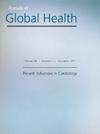Social Health Insurance and Healthcare Seeking Behavior in Urban Ethiopia.
IF 2.6
4区 医学
Q2 PUBLIC, ENVIRONMENTAL & OCCUPATIONAL HEALTH
引用次数: 0
Abstract
Background: After years of planning, in 2024 the government of Ethiopia proposes to introduce a compulsory Social Health Insurance (SHI) program for formal sector employees. The proposed scheme will provide access to contracted healthcare facilities at a premium of 3% of the gross monthly income of employees with another 3% coming from the employer. Objectives: Several studies have examined the willingness to pay (WTP) this premium, however, little is known about the healthcare seeking behavior (HSB) of formal sector employees. This paper investigates both – the determinants of healthcare seeking behavior and among other aspects, WTP the premium. Through these explorations, the paper sheds light on the potential challenges for implementation of SHI. Methods: Descriptive statistics, logit, and multinomial logit (MNL) models are used to analyze retrospective survey data (2,749 formal sector employees) which covers the major regions of the country. Findings: Regarding outpatient care, a majority of the visits (55.9%) were to private healthcare providers. In the case of inpatient care, it was the opposite with a majority of healthcare seekers visiting public sector hospitals (62.5%). A majority of the sample (67%) supported the introduction of SHI but only 24% were willing to pay the proposed SHI premium. The average WTP was 1.6% of gross monthly income. Respondents in the two richest income quintiles were more likely to oppose SHI and consider it unfair. Conclusion: The prominent role of the private sector and the resistance to SHI amongst the two richest income quintiles, suggests that the SHI program needs to actively include private healthcare facilities within its ambit. Additionally, concerted efforts at enhancing the quality of care available at public health facilities, both, in terms of perception and patient-centered care and addressing drug and equipment availability bottlenecks, are needed, if SHI is to garner wider support.埃塞俄比亚城市社会健康保险与求医行为
背景:经过多年的规划,埃塞俄比亚政府于2024年提议为正规部门雇员引入强制性社会健康保险(SHI)方案。拟议的计划将向雇员支付每月总收入3%的保费,另外3%由雇主支付,从而使他们能够使用合同医疗保健设施。目的:一些研究已经检查了支付意愿(WTP)这一保费,然而,很少了解医疗保健寻求行为(HSB)的正规部门员工。本文调查了两个方面-医疗保健寻求行为的决定因素和其他方面,WTP溢价。通过这些探索,本文揭示了实施SHI的潜在挑战。方法:采用描述性统计、logit和多项logit (MNL)模型对覆盖全国主要地区的2749名正规部门从业人员的回顾性调查数据进行分析。结果:在门诊方面,大多数(55.9%)是去私立医疗机构。在住院治疗方面,情况正好相反,大多数求医者(62.5%)去公立医院就诊。大多数样本(67%)支持引入SHI,但只有24%的人愿意支付拟议的SHI溢价。平均WTP为月总收入的1.6%。两个收入最高的五分之一的受访者更有可能反对SHI,并认为它不公平。结论:私营部门的突出作用和两个最富有的收入五分之一中对SHI的抵制表明,SHI计划需要积极地将私营医疗机构纳入其范围。此外,如果卫生保健制度要获得更广泛的支持,就需要在观念和以病人为中心的护理以及解决药品和设备供应瓶颈方面,共同努力提高公共卫生设施提供的护理质量。
本文章由计算机程序翻译,如有差异,请以英文原文为准。
求助全文
约1分钟内获得全文
求助全文
来源期刊

Annals of Global Health
PUBLIC, ENVIRONMENTAL & OCCUPATIONAL HEALTH-
CiteScore
5.30
自引率
3.40%
发文量
95
审稿时长
11 weeks
期刊介绍:
ANNALS OF GLOBAL HEALTH is a peer-reviewed, open access journal focused on global health. The journal’s mission is to advance and disseminate knowledge of global health. Its goals are improve the health and well-being of all people, advance health equity and promote wise stewardship of the earth’s environment.
The journal is published by the Boston College Global Public Health Program. It was founded in 1934 by the Icahn School of Medicine at Mount Sinai as the Mount Sinai Journal of Medicine. It is a partner journal of the Consortium of Universities for Global Health.
 求助内容:
求助内容: 应助结果提醒方式:
应助结果提醒方式:


